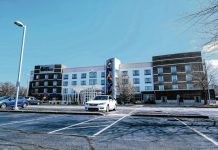Consultants are recommending that the city of Columbus should move forward with plans to create a downtown hotel and conference center — and even expand the scope of the project.
Hunden Strategic Partners presented an executive summary of their findings to the Columbus Redevelopment Commission on Monday. According to Redevelopment Director Heather Pope, the information has also been shared with Sprague Hotel Developers, the city’s partner on the development.
“Our next steps will be to go back to the Spragues,” said Pope. “…We have shared this PowerPoint with the Spragues, so they are aware of all of this and have had some conversations with them. And they’re in the process of updating their numbers from their initial proposal, which was pre-pandemic.”
The city’s current plans call for a new hotel conference center to be constructed on downtown property that the city is receiving as part of a land swap with the county. However, the project was put on hold by Sprague in 2020 due to the impact of COVID-19 on the hospitality industry. In March of 2022, the commission engaged Hunden Strategic Partners to complete a $21,600 update to their previous market and feasibility study for a downtown hotel and conference center.
The firm was hired for the original study in June of 2018 following the demolition of the Clarion Hotel and Conference Center. At the time, Hunden Strategic Partners recommended that Columbus could support a 140-room hotel with amenities such as 4,000- to 5,000-square- feet of conference room space, a 9,000-square-foot ballroom and a total of 380 parking spaces.
The firm is now recommending 150 or even 160 rooms and a 10,000 square-foot ballroom, said Rob Hunden. It’s also recommended that the project include 400 spaces in its parking garage — 150 for the hotel, 150 for the conference center and 100 to replace existing surface parking that would be eliminated during construction.
Other recommended features include meeting spaces, an outdoor patio connected to the ballroom, a rooftop event/food and beverage space, and a first floor restaurant.
The hotel and conference center is projected to cost about $43 to $44 million to develop, said Hunden. This includes an $11.8 million financing gap that would require some form of public subsidy of grant. The gap does not factor in the cost of land.
According to the firm, the previous study estimated a gap of $8.1 million — however, at the time, the estimated cost per room was lower. In addition to the increased room count, the per-room cost has now been elevated to $290,000.
“This is really just the same type of idea that I think the city and the CRC accepted before, but just on an inflated scale,” said Hunden. “The building’s slightly bigger, the parking garage is slightly bigger, the costs are larger due to size as well as inflation and the gap is larger. But relative to the total, it’s a similar percentage of the total.”
The firm’s 2018 study estimated a project cost of $25 million, according to previous reporting by The Republic. It’s unclear whether this projection included the cost of a parking structure or a proposed subsidy amount.
The new $43.5 million price tag does not include the cost of the parking garage, an additional $10 million cost if 400 spaces are included.
Hunden said that the firm believes the hotel and conference center could open as early as 2025. The hotel is expected to stabilize within three to four years and have an occupancy rate “in the upper 70 percentile range.” The average daily rate is expected to be $163. It’s estimated that, by then, other local hotels will have average rates of $148 per day.
“We still believe this will outperform the competitive set because it will be the highest-quality brand with the most amenities,” said Hunden.
The firm also estimated that, over a 20-year period, the hotel would bring about $800 million in net new spending, $250 million in net new earnings and 316 net new full-time jobs.
“Local hotel, income and property taxes are projected to generate nearly $1 million by year 5, and total approximately $22 million over 20 years,” the firm reported.
In regards to the project site, the city’s current plans call for the Bartholomew County court services building, located in the former Elks Club at 507 Third St., to be torn down. That would empty an entire county-owned block for the hotel and conference center between Second, Franklin, Third and Lafayette streets.
The city will receive that property as part of a land swap and, in exchange, has contributed to the construction of a new court services building.
Hunden Strategic Partners said that this area is still the recommended site. The alternative location — the post office at 450 Jackson St. — is not ready for development, especially given the cost of acquiring the property and relocating the post office.
Other topics covered in the firm’s presentation included possible brands for the hotel, effects of inflation, the economic impact of construction, and industry statistics.
Hunden expressed optimism about the hospitality industry’s renewal and said that there has been “a nice rebound in hotel demand.”
He did note that one of Columbus’s weaknesses is a strong reliance on Cummins, Inc. and large corporations to generate business travel and hotel revenue.
“That hasn’t changed, but it was underscored and somewhat exacerbated by the situation with COVID,” he said. “So there’s a little bit of a ‘to be determined’ on how, if and when they will come back. But what we’ve seen replace that has been higher leisure travel, a lot more people working from home because they can work from anywhere. And so people are starting their weekends earlier and ending them later. So while we’ve lowered our demand on corporate, we’ve increased it on leisure. And group (travel) is pretty strong as well.”
He added that the city still has a supply gap when it comes to providing the kind of “dedicated function space” this project could offer.





